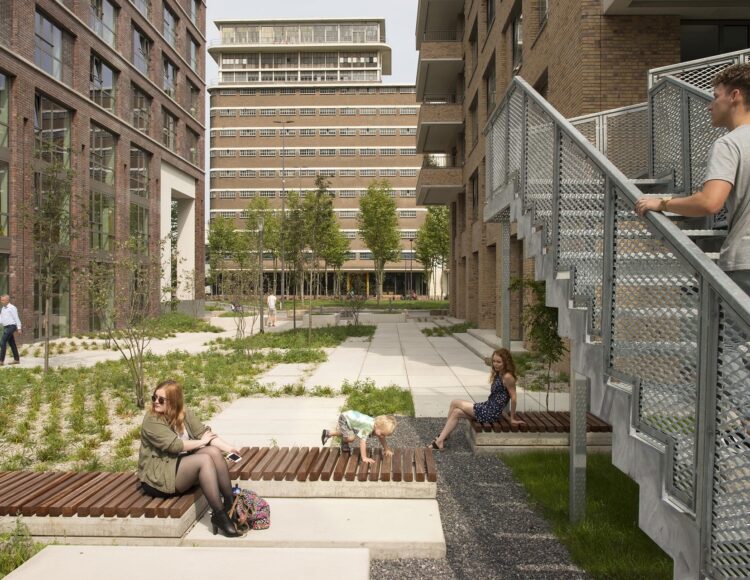As of 1 January 2023, landlords in the Netherlands will no longer be paying a tax for renting out homes at a rate below 737 euros. For a decade, the famous landlord levy that entered into force back in 2013, has been affecting almost only mission-oriented social housing providers given that privately-rented homes in the country have been drastically exceeding this threshold. Now that the abolition will be a fact in less than six months, Dutch social housing associations will have this operational cash flow back that will allow them to act on multiple fronts. We have spoken with our member, Aedes about a new set of binding performance agreements that set the bar high.
Speaking in numbers, the decision to lift the annual tax burden by 1.7 billion, leads to an increase in investment capacity by a multiple of that amount. The Association of Netherlands’ Municipalities (VNG), the recently-elected Dutch housing minister Hugo de Jonge, the large Amsterdam-based organisation that advocates for tenants’ rights, Woonbond, and our member, the Dutch Association of Housing Corporations (Aedes) decided to build more new affordable homes, insulate without impacting tenants’ already tight incomes, and further improve the quality of homes. This commitment comes at a crucial moment for the Netherlands, where thousands of citizens in Amsterdam have been marching against the housing crisis.
Securing housing affordability
Municipalities will ensure to offer 30% of social housing, relying on a clear definition of what this means to counter any false claims of actors pretending to be offering social housing. Rent increases in social housing will be limited for the next 3 years, and when necessary, any raise will not exceed the average salary increase. Tenants whose incomes are up to 120% of the social minimum will see their rent one-time lowered to 550 euros per month.
More affordable homes means building homes
The existing shortage will be faced and the new-build production of social rental homes will double from almost 16,000 in 2020 to an average of 33,000 homes per year, reaching about 250,000 newly constructed homes by 2030.
In the last years, more households across Europe relying on middle incomes have also been falling into the cracks of the housing system. The agreements will face this problem and create 50,000 homes by 2030 that are out of the scope of the Services of general economic interest (SGEI).
A Social Green Deal on the ground
In 2030, 450,000 social housing dwellings in the Netherlands will be free of natural gas. In practice, social housing renovation will be ‘free’ for tenants after insulation, meaning that rents will remain stable. This decision is going one step further than cost neutrality which guarantees that the increase of the rent does not surpass the energy savings resulting from the works.
In a moment when the energy performance of buildings is one of the hot topics for the sector, Aedes has also signed that according to the current measurement and scale, there will be no homes that fall under the (current) three lowest classes, E, F, or G. Finally, 675,000 social housing buildings will be insulated to a high-standard level.
Investment in a better quality of living and wellbeing
An additional investment of €200 million per year will be used to further improve fire safety, remove mold or asbestos which is a fibre that was widely used in construction in the past and that has been proved to be harming health.
In an ageing Europe, Dutch social housing will be also more fit for the needs of the elderly as 50,000 clustered homes will be created, a series of small units with a bed, bathroom and kitchenette that are arranged around large common spaces, providing people with their own space but also a place to socialise and not experience loneliness. Another €47 million per year will be invested in making neighbourhoods cleaner, more pleasant to live in and creating spaces where people can mix and mingle.
“This agreement allows us to look forward again, instead of looking back. Because we can throw off the yoke of the landlord levy, we get the space to invest again, while at the same time we keep housing affordable and moderate the rents for the people who need it most. We are investing in more new affordable homes, accelerating the sustainability of the housing stock, and strengthening liveable districts and neighbourhoods. In this way, housing associations are taking the lead in combatting the housing crisis. But we do not do this alone: the strength of this agreement lies in the fact that we do this together with municipalities and (future) residents. We need each other in the acceleration we want to make together,” the Chairman of Aedes, Martin van Rijn, told Housing Europe.
The years ahead sound promising for tenants in social housing in the Netherlands despite the multiple challenges that the sector is facing. Expect to hear more about how housing affordability, availability, sustainability, and liveability are evolving in the country, and how can other housing systems take a similar track.
